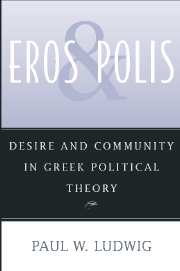Book contents
- Frontmatter
- Contents
- Acknowledgments and a Note on Citations
- Introduction
- PART ONE Political Eros: An Account from the Symposium
- PART TWO The Discourse of Political Eros
- THREE Scientific and Poetic Traditions of Eros in Thucydides
- FOUR The Problem of Aggression
- FIVE The Problem of Sublimation
- PART THREE The Polis as a School for Eros
- List of Works Cited
- Index
FIVE - The Problem of Sublimation
Published online by Cambridge University Press: 10 December 2009
- Frontmatter
- Contents
- Acknowledgments and a Note on Citations
- Introduction
- PART ONE Political Eros: An Account from the Symposium
- PART TWO The Discourse of Political Eros
- THREE Scientific and Poetic Traditions of Eros in Thucydides
- FOUR The Problem of Aggression
- FIVE The Problem of Sublimation
- PART THREE The Polis as a School for Eros
- List of Works Cited
- Index
Summary
Although the modern word sublimation implies a value judgement about the relative goodness of higher and lower eros (“making eros sublime”), it should be clear from the violent and politically destructive erotic sickness of Philocleon that the allegedly higher activities into which eros is channeled by conventional morality may also be conceived of as unnatural and undesirable. Aggression and sublimation may not be as opposed as they at first seem. Various thinkers in antiquity also recognized this difficulty with sublimated eros and recommended sexual release before the higher emotions could have a chance to take hold. Each of these thinkers implicitly or explicitly accepted the principle that the sexual desires of the body are connected to political and other desires of the heart and mind. Furthermore, two literary characters, portrayed by Plato and by Aristophanes, respectively, can be seen to represent diverse stages of sublimation and to make different trade-offs between sexual desire and love. The latter concept, love, has received short shrift in the recent scholarly literature on Greek eros, which has focused primarily on sexual intercourse and the societal conventions governing it. In this chapter it is argued that lengthy courtship, sublimation, and love could be expected to be more, not less, prevalent in a society, or stratum of society, that accepted and encouraged homoerotic orientation while attaching a stigma to its sexual consummation. Historical parallels and the modern theories of Freud are adduced to show the political and the cultural implications of sublimation.
- Type
- Chapter
- Information
- Eros and PolisDesire and Community in Greek Political Theory, pp. 221 - 258Publisher: Cambridge University PressPrint publication year: 2002

